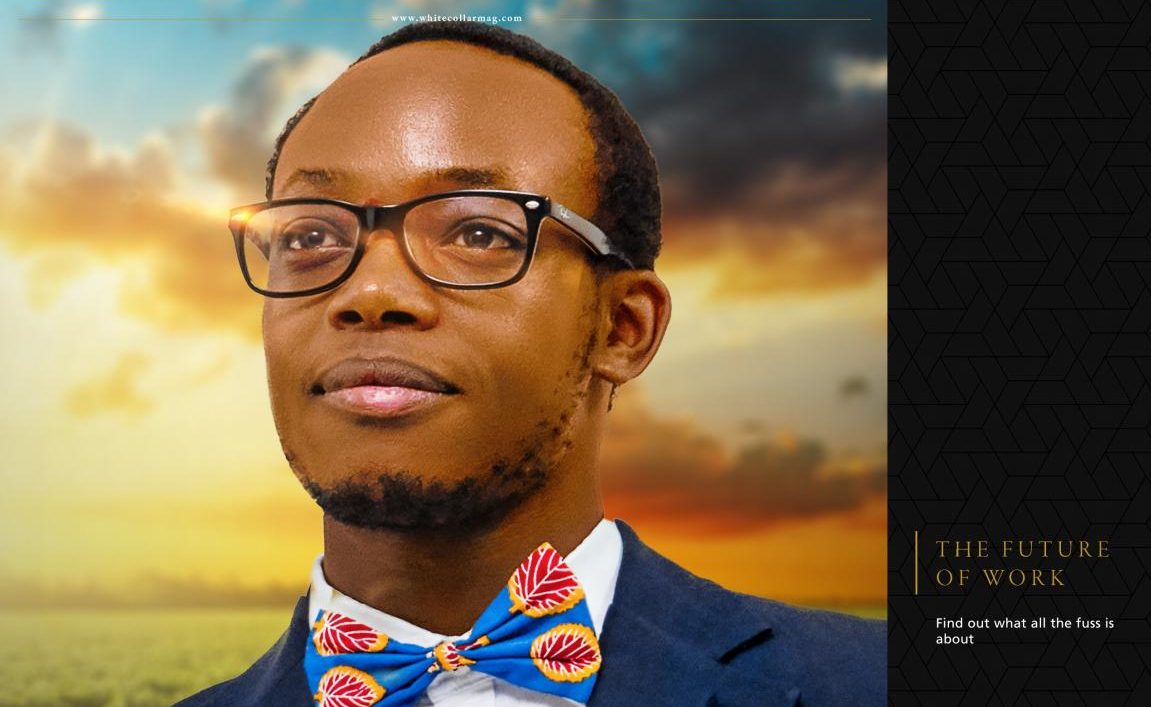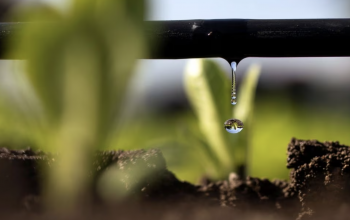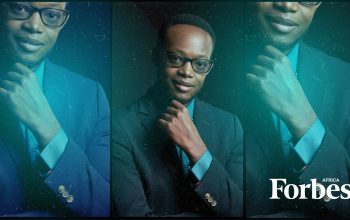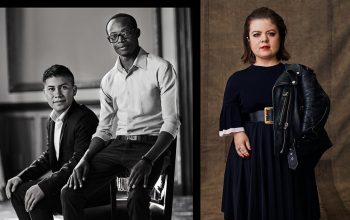A conversation with Brian Bosire, Founder and CEO at UjuziKilimo and HydroIQ.
“…It’s a world of possibilities,” said Brian, “It’s a WORLD… of possibilities.” He repeated in a lower, hushed tone.
And as I registered the pause, I finally began to grasp the full weight and potential of what was going on at Ujuzi Kilimo and HydroIq. It was about 11:09 am and I was wrapping up the interview. Through the session there were moments when he would briefly space out, or make side notes on his laptop. He seemed to be juggling about 3 or 4 other thoughts at the same time. “I have always been curious. I keep looking at things and wondering, how does this work? Can it be improved? And if we were to, how would we make it better?” This is a continuous process for Brian, which means that ideas pop up at their own discretion irrespective of time and place.
Everything kicked off with the usual pieces of conversation, “hope you found the place okay” and the ‘I usually take this or that route because it’s faster’. Walking into his offices I didn’t know what to expect. I wondered if they really had ‘the stuff’, or if they were something ordinary wrapped in good PR. Would they live up to the hype that comes with winning ‘Best, Internet of Things (IoT)’ at Apps Africa, and the ‘Judge’s Choice’ award at the Google impact Challenge?
Small talk moved to jokes and then to a conversation:
Who is Brian?
It’s actually hard to describe myself.
Uhmm… I’m an engineer. I’m eager to try and solve problems. I’m very curious. In any situation I find myself in, I’m constantly examining how everything goes on, trying to find if things could be done better?
Tell us more about your background:
My background is in Electronics Engineering and I studied that at JKUAT (Jomo Kenyatta University of Agriculture and Technology) and halfway through I realized entrepreneurship could be one of the more exciting things I could do. I actually started spending more time developing my businesses rather than going to class.
I left school late in 2016 and at that point I was already running two start-ups (that was Ujuzi Kilimo and another one that closed down called Electrosoft).
Before that though, I went to Kisii High School. I think that’s where my journey into the engineering world started. We did these very technical subjects, power mechanics, electricity, and that was my passion in high school.
What was your childhood like? Did you enjoy it?
My childhood was happy and content.
My family was not rich, it was fairly basic; my dad was a civil servant and my mom was a high school teacher. It was a classic rural setting.
I think that kind of setting contributed a lot to how I turned out because, in the rural village a lot of the basic needs are available and this gives you the ease and comfort you need in order to think big.
I’m the second-born in a family of six siblings. My sister, who is the first-born, had a lot to do however from a cultural perspective, my father would pull me aside and say ‘being a man you have a bigger responsibility.’So I grew up feeling that I have a responsibility to look after and inspire my siblings.
Who were your role models?
Frankly, when I was a kid I really didn’t know any thing about role models.
The first time I thought that somebody could be a role model was when I was in high school and it all came as a result of curiosity.
There were a few teachers in school that everyone looked up to however we were learning the basics behind a lot of technology and I started to see past the products and acknowledge the minds that made these devices. The intelligent minds behind all these products from the mac book to the radio were my role models whether I knew who they were or not.
Looking back, were there any personality traits in your early life that signalled a career in Tech & Business?
Yeah. I was the child who opened up all the device at home to try and figure out how they worked. No device was
left untouched, hehe! The interesting thing is the more I studied these devices, the more I wanted to replicate what Isaw or improve the existing design.
I remember at one point we didn’t have electricity and so we bought and installed a solar panel. I didn’t like how the connections were done so I actually cut out all the wiring in our house and made it much more efficient because there was a lot of wastage in cabling. Another case happened around high school. We were lucky enough to be the only guys who had a radio CD player and all my friends in my neighbourhood would come to our house to listen to music.
The western education system isn’t good or bad either. It comes down to culture. For them, kids are actually encouraged to follow their passion and the systems are already in place to support them along the way.
So I took some radio parts, fixed it and I found out thatI could actually put out a signal. My friends could then just tune in with a scanner radio and still listen to music at their home. I had made a broadcasting station and didn’t know it. I think that was when I knew I was going to become an engineer.
Do you feel that education has adequately equipped you for your career and business? If not, what changes would you advise to help improve the quality of education?
I can’t say that the local education system is bad. It’s more about how you train people within a particular system.
I think the good thing about the local system is that it offers a wide range of information, which can be a good and bad at the same time. For me I feel it probably worked out well because if somebody tried to observe me since my childhood with the intention of trying to herd me into following a particular path, I probably wouldn’t be the person that I am, now.
The western education system isn’t good or bad either. It comes down to culture. For them, kids are actually encouraged to follow their passion and the systems are already in place to support them along the way.Now if we did the same in Kenya, it wouldn’t work out as well as it does over there. Imagine if you pushed a kid in Marsabit, for example, to pursue music. As wonderful as music is, how would he use it to improve the quality of the lives of the people in his community? We need to first look at the surroundings; Is the infrastructure and the ecosystem capable of supporting the career of our choice?
What was your first job, and what did you learn from it?
I worked as an intern twice.
My first job was at Equity Bank, as an agent relationship officer, which is the title for the guy who moves around tallying books and assessing agents. And frankly, I was really bored. That lasted for just one month.
Then in my third year I went to Mumias Sugar Company and I think that was the most exciting job I had, and it ended up lasting for about four months. At that point, there was a lot of investment in new technology at Mumias and I was really curious about how industrial processes worked, how was structured and managed.
After that the third job I had was for a day. I was offered some job at KenyaPower and worked for a day and quit!I don’t like places where there is alot of comfort. The first day I went,I worked in the I.T. Department, ensuring that all their computers and everything is running OK. You walk into an office, somebody calls and says they have an issue; then you realize actually the problem is that they never switched on their sockets.And then we had to, of course, record what you’ve done for the day.How do you even record that? “I switched on a socket”? People were so comfortable that if there was no work to do they were happy just take tea and relax.
What made you decide to into business, and why did you choose farming as starting point?
When I look back to when I started the entrepreneurship journey; I was more of an engineer than an entrepreneur.
I remember going to the farm five in the morning until five in the evening and having accomplished nothing.I used to challenge my mom, “Why are we spending all this time? What are we doing?” So I said the first thing is just to have a simple thing that farmers could get information out of. Nothing was really defined perse, but that is what I wanted to do.

Your first company Electrosoft failed. What lesson did you get from your experience?
The first thing I learnt is that it’s important to manage personal expectations and also that the quality of people you surround yourself with matters because they shape what kind of entrepreneur you become.
When I started out I would say,“Within three years, I’ll be earning money.” And everybody around meat that point nobody knew nothing about entrepreneurship. So you are only one selling out this big vision and when everything fails, it’s hard actually say that things are not working.
So starting off, just be patient and just be curious and learn a lot.
The best thing is look for people who have already done something. They go a long way in helping you skip some of the stupid mistakes that you would make. So learn, be patient, and get the right guys.
What does UjuziKilimo do?
When we started the whole idea was having a gadget that my mom will stick into the ground and two minutes later she knows what’s going on with the soil for example, “My soil is too acidic, I need 20 kg of lime to start off”. We set out to help farmers make better decisions. We spent a lot of time on the business model. It wasn’t really defined but the problem was clear and we had the solution. In fact, we were recognized, in 2015, by the American Society for Mechanical Engineers for creating this solution.
We had a working product but we needed to figure how we would make money from it. That was a big challenge because then we had to look at the cost of this gadget; production alone costs about KSh.30,000. No farmer will spend that amount on a single purchase especially if it isn’t an immediate need and to be honest that’s probably their entire farming budget.
We however found out that the better way to do it, was to offer a data centric service; so we gathered as much data as we could from our devices, and created a platform which would provide information on demand. Information can cost as little as 1 shilling per text. This model worked and woke us up to the fact that our most valuable asset is actually not just in the gadget but the data collected from the gadget and how we distribute it. So Ujuzi Kilimo evolved to become an agricultural data company.
Traditionally if you’re doing soil testing, you could take A MONTH from sampling to sending it to a lab and finally getting information at quite the expense to the farmers. We are doing that in FIVE MINUTES at the farm!
We took things a step further and integrated satellite imagery. So it means as long as they know the location of the farmer I can tell everything about the soil remotely. Which is now a very huge leap frog into reaching the most remote areas. Of course, we care distributing that information to farmers but we have also noticed that input suppliers need it as well and have started to collaborate with some of them.
So one of the things that we’re doing in Central – where we

just started piloting- is we figure out what your soil needs, it could be lime. So, Why don’t we then stock and deliver that lime to you? We’ve ended up creating a predictive model that anticipates our client’s needs. It has surely been a journey of learning ‘on the way’!
Are there any missed opportunities that you wish you leveraged?
I don’t think there is. Because, for me, almost everythingI’ve done has probably been born from a challenge.However the closest I could relate to missing an opportunity is not realizing how powerful connections to the right people can be.
Data science is the common thread that ties both your companies together. What could local companies and start-ups gain by incorporating Data science into their practices?
Generally speaking, we are at a point calledIndustry 4.0 where everything is data driven.We cannot afford to ignore or avoid data regardless of whether you’re the biggest monopoly or the smallest start-up or just any individual person.
Companies are going to great lengths to get more and more data.And instead of just storing all that accumulated data about every thing and everyone, it makes more sense to start sorting the data, and this starts to reveal trends which become valuable insights.
The insights you get open up whole new worlds.

Let’s focus in on hydro logistics Africa, which you have called the world’s first virtual water Network operator. What does Hydro logistics do?
The idea really came out of a very simple experience.You’re at the house, and your water gets disconnected. It’s the only story everyone in Nairobi shares. Also after intense water shortage you still have to pay the water bill. It is a very clear challenge and it’s one that we’re continuing to solve.
Because water is life, the main interest lies in controlling the resource. However if we can look past control, we seethe main issue resulting in shortages is the fact that in almost all African countries about half of the water is lost
before it reaches the consumers, and that is clean, drinkable, treated water.
The second issue is about how people bill for the water. There are reliability and consistency issues here. A good example is the best performing public water utility in Kenya which is only collecting probably 50 to 70 per cent of the revenue they are owed. And because they aren’t
making as much money as they should, they can’t afford to do upgrades and this leads to more
water leakages and losses. And more losses means less money is collected. See the cycle?
HydroIQ ideally want to make every drop of water count. We want to bring transparency. And by transparency, we mean everything from the distribution channels to the consumer. The second element is on bringing reliability and efficiency within the
systems. Because if you’re able to even track a drop of water from source to final destination, that actually unlocks a lot of insights on where you actually need to put your money. Currently, it takes more than six months to even identify a water leakage. If that could be done tended to within a day or two, that is millions of litres of water made available to the consumer.
The third thing is how we as consumers actually use water.Generally speaking, water consumption per individual has been reducing because of increased efficiency in the machines and the things that we use at our homes. If you could give consumers the power to understand their consumption, you unlock a lot of savings on water.
HydroIQ aims to fill all these gaps, bring transparency in the water distribution networks by creating a smart water-grids. The second aspect is to enable people to track their consumption, and make payments, and actually understand that “we are doing this because we consume this amount”. I get my water bill, even in his office, sometimes it comes to Kshs.9,000 and then the next month we get Kshs.1000. We want to end situations like these.
How does HydroIQ differ from other companies like Kamstrup (which has been around for over 25 years) that offer smart meters?
The thing is, the fact that there’s a lot of players is one of the biggest advantages. Our play is not to go into in the smart meters. I can actually attest that in the next 10,20, 30 years smart meters are going to be their standard because of the efficiency. The only issue is the cost of introducing these technologies.
That being said our play is not going into meter production like Kamstrup, Honeywell, Siemens who are all device-makers have the products and they have their platforms for smart metering.
But the issue is they’re only approaching it from one side.For us, we are open; what we want is to be the guys who
complete the loop. So when you bring a smart meter tool and install, it that is the one side of it. What completes it is the end user experience. How do I get my readings? How do I pay for the water? Is there transparency? Can these guys be trusted? Most people don’t even remember that there is a meter somewhere. So if you come into the market selling the meter, you are not capturing the real problem for the consumers who the majority and the drivers of the market.
We call ourselves the biggest virtual water network operator.We don’t want to own the infrastructure, but we want to have the biggest platform that integrates to whoever is the player on the infrastructure part.
The meter is just sending data. That is one side. The other side is: what you do with the data. Third, is the information and educational aspect of the consumers?
You have identified poor water infrastructure as one of the problem areas facing Africa and the world. In a country such as Kenya, our local governments manage water distribution. Are you collaborating with government institutions?
Government is interesting!
It’s always the biggest player in the room. The other aspect is; when you’re starting off, don’t feel like government plays a bigger role. But when you map out your business for the next 2, 5, 10 years you have to factor in the role of government. For now we just having those conversations at a very basic level, trying to link with what is highly regulated, from WRMA (Water Resources ManagementAuthority) to WaSReB (Water Services Regulatory Board).
There’s a lot of players and county governments are the ones managing local water resource and this has been the case since we got a devolved government. Now that water is devolved, every county governments have a say.Governments don’t want disruptions to an ecosystem that is somewhat working. They regulate everything to ensure as much stability as possible.
But we are a technology company, we don’t want to feel limited by some regulation, we want to disrupt. So it’s a balance; we try to tell them that the beauty of this, educate them, tell them that this is the best way forward. I always say that the biggest thing is let the consumers drive everything. Getting a million or everyone in Nairobi using HydroIQ; I don’t think our government would be in a position to deny us. So the more adoption you have, the faster you grow, the more feedback you get from both sides, then more credible you become in front of government.
Do you feel as though your innovations have been better received internationally rather than locally?
The biggest difference I think is the culture.
I feel like we have a long way to go as professionals and just as entrepreneurs.
In Kenya, you grow in an environment where things go slower, lesser expectations, and more understanding to failure.
When abroad if you go out and say, “I’ve registered a company and we are doing this,” then you better do that. The standards are already set high. In Europe, you as a start-up, you are obligated to ensure that all your statutory requirements are met from day one.
On the work ethic as well, there’s a bit of a difference and it’s mostly centred on to the self-drive of the person. Generally, I feel like we have a long way to go as professionals and just as entrepreneurs. Our systemthat probably was the first question you asked about the educational system educational system – is not giving the right skills to prepare people for the real world. We’re producing graduates with no skills. And you start to wonder why Africa has such a tremendous skills gap.What’s next for you your company?
For Ujuzikilimo, we’ve been concentrating our efforts on Central region, it’s our first market and we are working with over 11,000 farmers over there. By the end of the year we’ll be in three other most active regions in Rift Valley and Western. By the end of 2019 we intend to be working with over 100,000 farmers in Kenya. We’ll also be setting up at least one pilot in East Africa and
we are considering Tanzania as a logical next step. Given their farming practices there it seems to be one of the best places to start the east African pilot.
For HydroIQ, our biggest target for next year is to hit our target of 30,000 households. I think it could bigger or less, depending on the guys that we work with. We want, in our second year, to cement our presence as the guys who actually bring transparency the water system. Whether you’re a consumer, think of a wrong bill and think of HydroIQ; if you’re a water utility or supplier think of your revenue losses and think HydroIQ has the solution.
Find the original interview piece here. .



